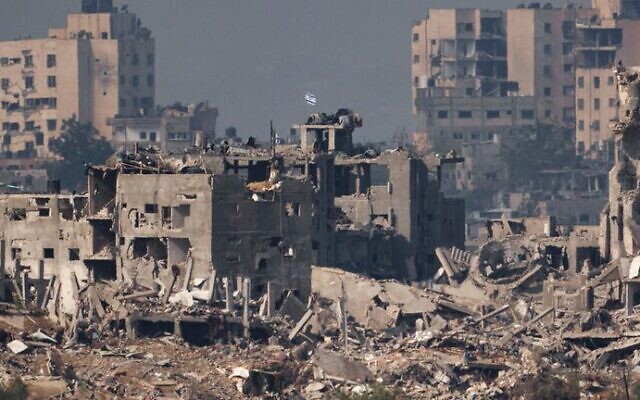OPINION: Case for a ceasefire: an issue of law and values
Even if it leaves things in myriad ways still unsafe and unjust, and even if only temporarily, a ceasefire is now required as a matter of law
Ten days into the conflict, with a group of seven other British Jewish lawyers, including Lord David Neuberger, former president of the Supreme Court, I signed a letter, reported in the Financial Times, seeking to use law to make sense of the terrible events unfolding in Israel and Gaza.
Most of the time I prefer to be a lawyer who just happens to be Jewish, but in this instance, I declared myself to be a Jewish lawyer. This is my explanation.
In the letter, we emphasised that international law condemns and categorises the despicable crimes that were committed by Hamas against Israel as war crimes and crimes against humanity. We also explained that the law places clear limits on what can be done by Israel in response, however challenging that is, and however painful and truly terrorising Hamas’ actions have been.
Although the laws of war are not pacifist they can run counter to human instinct. Their genius – which is often overlooked – is that they do not require reciprocation and they demand that the justice of a cause is uncoupled from the manner in which that cause is executed.

To that end, even if we recognised that Israel had a right to take action to defend its population, what it could lawfully do within the overpopulated, de-developed and blockaded narrow geographical confines of Gaza would inevitably be limited.
Although our letter did not say so expressly, it did follow that more than just military approaches must be sought to deal with the threat posed to Israel by the outrages of Hamas terrorism. Likewise, an exclusively military approach was always going to be legally unsustainable as regards the stateless and terrible humanitarian predicament of ordinary Palestinian people, and the threats in different ways posed to them.
It is difficult to see from a legal point of view how the continuation of military action in Gaza at this time would be concordant with international law.
The hostilities in the days which have passed since we wrote the letter have breached those limits of the laws of war. Israel’s response to the attack on its territory has involved catastrophic mass fatality and untold human suffering of Palestinians – not only as a result of aerial and ground bombardment, but through, among other features, cessation of basic sustenance and amenities, destruction of medical facilities, and forced movement of populations within the blockaded geography of the Gaza strip. These are also grave war crimes. They must be characterised as such notwithstanding any continuing other crimes upon Israelis, foremost of which is the continuing and agonising incommunicado detention of Israeli hostages.
Irrespective of how the offences might ultimately be classified under international law upon detailed investigation, it is difficult to see from a legal point of view how the continuation of military action in Gaza at this time would be concordant with international law. The cumulative position therefore makes a ceasefire a matter of legal imperative, irrespective of whose side one takes in these events, or whether one takes no side at all. Not by virtue of reciprocation, but as a freestanding imperative, the release of the hostages must occur immediately.
As a lawyer I do not find these observations to be controversial. However, I signed that letter not just because I am a lawyer who has dedicated much of his working life to dealing with war and terrorism, but because I am Jewish; and indeed because I have been raised in a post-Holocaust Jewish culture that is fundamentally committed to the rule of law and humanity, precisely because that is the best means of protecting Jews and all others from persecution.
The law of war in that respect is ‘Humanity’s Law’.
I fully appreciate that some will disagree with me for not being emphatic enough either way, or not making essential points of context about the occupation or the various competing accounts of when resolution might have been achieved and why it was not. Of overlooking the full details of the horrors that have occurred in these last weeks; and for reducing the richness of Palestinian life to a bare humanitarian cause.
I am also deeply aware that there are those in my Jewish communities – communities not a single community – who will disagree with me for my views and for being naïve about the consequences of such legal restraints when they will not be reciprocated.
We are at a moment of great undoing. Witnesses to terrible violence not only over the last weeks, but over many decades, not just to life, limb and psychology, but also to hope.
Those people include some of my close friends from my Jewish school, youth clubs, synagogue and colleagues in my working life who are in Israel or passionately connected to it, and indeed connected to those who have lost their lives or been taken hostage.
Be all those disagreements that can be held in good faith, I make the case for a ceasefire not because I am against Israel. I am pro-Israel, but I am also pro-Palestine.
We are at a moment of great undoing. Witnesses to terrible violence not only over the last weeks, but over many decades, not just to life, limb and psychology, but also to hope. In these dark times of hopelessness, is it therefore possible to reaffirm together that we share in a body of law that is fundamentally committed to respecting life, security, dignity and self-determination?
The accident of my heritage, just as many with views in this conflict are influenced by the accident of theirs, is that I have found my way to human rights and humanitarian law through my culture and my upbringing. Therefore, whatever my affinities and the limits of my understanding, one of the functions of these international laws is that they are the means of cutting through competing narratives.
They are the practical and ethical compass for navigating through the most painful of choices. They are part of modern Jewish identity, but they also represent something of a post-1945 covenant to reinvest in the future of the world. Even if it leaves things in myriad ways still unsafe and still unjust, and even if the end of violence, even temporarily, is only the beginning of greater challenges, a ceasefire is now required as a matter of law.

Thank you for helping to make Jewish News the leading source of news and opinion for the UK Jewish community. Today we're asking for your invaluable help to continue putting our community first in everything we do.
For as little as £5 a month you can help sustain the vital work we do in celebrating and standing up for Jewish life in Britain.
Jewish News holds our community together and keeps us connected. Like a synagogue, it’s where people turn to feel part of something bigger. It also proudly shows the rest of Britain the vibrancy and rich culture of modern Jewish life.
You can make a quick and easy one-off or monthly contribution of £5, £10, £20 or any other sum you’re comfortable with.
100% of your donation will help us continue celebrating our community, in all its dynamic diversity...
Engaging
Being a community platform means so much more than producing a newspaper and website. One of our proudest roles is media partnering with our invaluable charities to amplify the outstanding work they do to help us all.
Celebrating
There’s no shortage of oys in the world but Jewish News takes every opportunity to celebrate the joys too, through projects like Night of Heroes, 40 Under 40 and other compelling countdowns that make the community kvell with pride.
Pioneering
In the first collaboration between media outlets from different faiths, Jewish News worked with British Muslim TV and Church Times to produce a list of young activists leading the way on interfaith understanding.
Campaigning
Royal Mail issued a stamp honouring Holocaust hero Sir Nicholas Winton after a Jewish News campaign attracted more than 100,000 backers. Jewish Newsalso produces special editions of the paper highlighting pressing issues including mental health and Holocaust remembrance.
Easy access
In an age when news is readily accessible, Jewish News provides high-quality content free online and offline, removing any financial barriers to connecting people.
Voice of our community to wider society
The Jewish News team regularly appears on TV, radio and on the pages of the national press to comment on stories about the Jewish community. Easy access to the paper on the streets of London also means Jewish News provides an invaluable window into the community for the country at large.
We hope you agree all this is worth preserving.






















